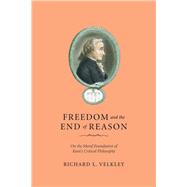Freedom and the End of Reason
, by Velkley, Richard L.- ISBN: 9780226852607 | 0226852601
- Cover: Hardcover
- Copyright: 7/10/1989
Richard L. Velkley offers a new interpretation of the central issue of Kant's philosophy and a new evaluation of its position within the history of modern philosophy. He persuasively argues that the whole of Kantianism, not merely the Second Critique, is really a "critique of practical reason" and a response to a problem Kant saw as intrinsic to reason: the teleological problem of reason's goodness. By stressing a Rousseau-inspired notion of reason as a provider of practical ends, Velkley also is able to offer an unusually complete account of Kant's idea of moral culture. Drawing upon Kant's precritical writing of the 1760s, Velkley effectively argues that Rousseau showed Kant that the purely instrumental view of reason as the mere slave of passions--a view advanced by such Enlightenment thinkers as Hobbes, Locke, and Hume--was self-defeating. Their modern conception of reason attempts to emancipate humanity from superhuman powers and authorities, but it paradoxically brings about the deeper enslavement of humanity to its own artifacts and passions. Rousseau's thought provided Kant with certain decisive elements in his account of reason, especially through a new concept of freedom, that enabled Kant to establish the foundation for a coherent version of the Enlightenment, one that reconciles modern emancipation from "dogmatism" with the human need for the sacred, the noble, and the beautiful. In reconstructing the influence of Rousseau on Kant's thought, Velkley demonstrates that the relation between speculative philosophy and practical philosophy in Kant is far more intimate than has been generally perceived. The "dialogue" of Kant with Rousseau in the 1760s begins the debate on the soundness of the modern "enlightenment" understanding of the relation of reason to society and the human good, a debate that is continued by the major Continental philosophers. Velkley's formidable study establishes that the later modern reforms--new ideas of freedom, history, and culture, which replace human nature as the ground for knowledge of the human good--have their primary roots in Kant's encounter with Rousseau.







